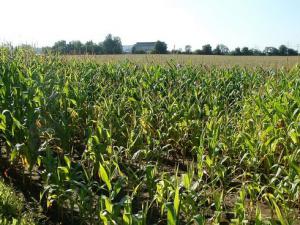Food securityGrowing demand for bioenergy threatens global food supply
As countries around the world look for ways to reduce their use of fossil fuels, the growing demand for bioenergy runs the risk of threatening the global food supply. Researchers have developed a certification scheme for biomass resources designed to incorporate food security, to help ensure people in affected regions of the world can continue to put food on their tables.

Cornfield nearing harvest // Source: commons.wikimedia.org
As countries around the world look for ways to reduce their use of fossil fuels, the growing demand for bioenergy runs the risk of threatening the global food supply. Researchers reporting in Biomass and Bioenergy have developed a certification scheme for biomass resources designed to incorporate food security, to help ensure people in affected regions of the world can continue to put food on their tables.
Elsevier notes that the report by researchers at the University of Bonn in Germany has been granted the Elsevier Atlas Award of April 2016.
“The problem of this growing demand for bioenergy is that this trend may have adverse impact on food security through direct competition between biomass and food production when it comes to available resources such as land and water,” said Anna Mohr, the lead author of the study who is now based at Puro Verde Paraíso Forestal SA in Costa Rica. “This might lead to lowered food supplies and also to rising food prices at the local or international level.”
In their work, Mohr and her colleagues began with scrutinizing nineteen guidelines issued by the Food and Agriculture Organization of the United Nations in 2004 to support the progressive realization of the right to adequate food in the context of national food security. The researchers translated those nineteen guidelines into forty-five criteria designed to ensure that food security isn’t adversely affected by certified biomass production.
Those criteria include a wide range of considerations, from land rights to living wages to disaster preparedness. For instance, the land used for bioenergy production should be free from land disputes with local people, Mohr explained. If companies are making use of land to produce bioenergy instead of food, then they must also pay local people a living wage to ensure they have the ability to purchase healthy food they can no longer grow for themselves.
“The rights-based food security principle is a best-practice set which provides guidance for regional and national standard settings as well as for private certification schemes,” Mohr and her colleagues said. “It is hence an important tool to avoid negative effects on local food security, induce positive changes and monitor the local food security situation.”
It is now up to governments and the public to demand a standard that assures food security in biomass investments or imports. “There’s always an important interplay between private certifications standards and government regulations,” Mohr said.
— Read more in Anna Mohr et al., “Food security criteria for voluntary biomass sustainability standards and certifications,” Biomass and Bioenergy (2 March 2016) (doi: 10.1016/j.biombioe.2016.02.019)
